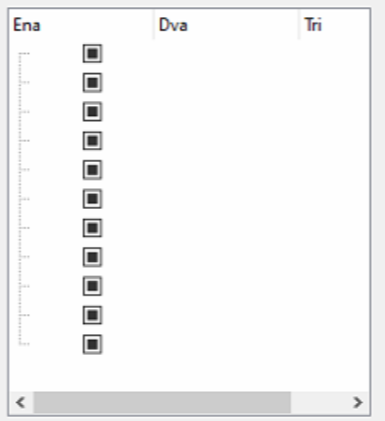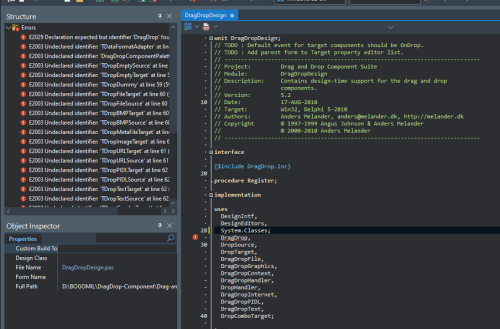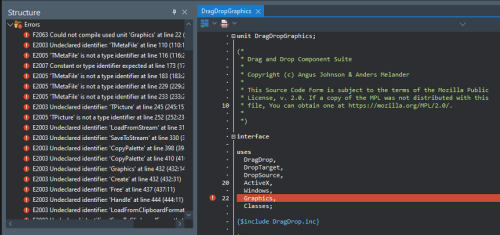

direktor05
-
Content Count
61 -
Joined
-
Last visited
Posts posted by direktor05
-
-
Does anyone know why this cxTreeList does not display text in front of checkbox? There is space but characters are not seen. I tried setting styles and font color it doesn't work.

-
On 10/15/2024 at 11:08 AM, BertB said:Check out DevExpress
Their grid can do what you need, but the pricing might be a problem for you.
You mean because I'm too poor from Africa? 🙂
-
The error I get is 1813 - resource not found
-
I'm getting a ton of issues converting from x32 to x64. First one:
var
Size: Cardinal;
Handle: Cardinal;
FileName: String;
begin
if ModuleName = '' then
FileName := OAExeName
else
FileName := ModuleName;
Size := GetFileVersionInfoSize(PWideChar(FileName), Handle);Size returned is 0 and the error is:
VerQueryValue (Language in Project Settings/Version Info has to be set to English (United Kingdom))
var
SubBlock: String;
ValuePointer: Pointer;
ValueLen: Cardinal;
begin
SubBlock := '\StringFileInfo\080904E4\' + ValueName;
TestGetLastError(VerQueryValue(@FBuffer[0], PWideChar(SubBlock), ValuePointer, ValueLen), 'VerQueryValue (Language in Project Settings/Version Info has to be set to English (United Kingdom))');
Result := PChar(ValuePointer);So what is wrong? I assume it's the variable (un)signed-ness again. GetFileVersionInfoSize(PWideChar(FileName), Handle) - Handle must be Cardinal according to API definition.
How can I fix this?
Another one is array of Byte variable is causing AV error.
-
Hello,
Does anybody know of a Grid or ListView component that has both checkbox and combobox? I'm trying to get rid of LMD treelist. Should support x64.
Regards
-
16 hours ago, Remy Lebeau said:That code risks pointer truncation in a 64bit build. The integer typecast should be using NativeUInt or UIntPtr instead. Or, use pointer arithmetic via PByte instead.
Also, the file list is a double-null terminated list, so make sure you account for that in case multiple files are dragged. Also, depending on the source, the file names may be using Ansi or Unicode characters, so pay attention to the DropFiles.fWide field.
REMY YOU SOLVED MY PROBLEM! THANKS.
-
ha ha, ok I'll bite you
-
In my code the file list is not filled:
FileName := PWideChar(Cardinal(DropFiles) + DropFiles.pFiles);
where DropFiles comes from WinApi.ShlObj - which means the file list is not being transferred from Windows on IDropTarget.DragEnter
IDropTarget.DragEnter is called but the file list is empty.
-
14 hours ago, Anders Melander said:No; It works with all drop targets.
And if you look at the WM_DROPFILES example there's also an example of working around the UAC restrictions mentioned by Remy:
You could also tell me your idea of "example of working around the UAC restrictions " so I don't have to go through your non-working code.
-
-
14 hours ago, Anders Melander said:No; It works with all drop targets.
And if you look at the WM_DROPFILES example there's also an example of working around the UAC restrictions mentioned by Remy:
Is this component made only for Delphi up to 2011? How about Delphi 11?
-
Remy you are genius!
-
Anders your component probably does diagnostic according to your component functions not in general. I need a solution how do you check if a procedure of function is executed/called inside OLE/ActiveX dll, better yet specifically inside shell drag drop dll? Any hero here?
-
How can I check if OLE is called? CoInitialize works OK. RegisterDragDrop also OK. There is no error anywhere but the thing does not work. How can I test a call to OLE dll?
-
procedure TForm1.Create(Sender: TObject);
begin
RegisterDropTarget(TFileDropTarget.Create(FileDragEnter, FileDragOver, FileDragDrop, FileDragLeave));
end;procedure TForm1.RegisterDropTarget(Handler: IDropTarget);
begin
RegisterDragDrop(Handle, Handler);
FDragDropHandle := Handle;
end;procedure TForm1.FileDragEnter(Sender: TObject; FileList: TStrings; Point: TPoint; Shift: TShiftState; var Action: TFileDropAction);
begin
IT NEVER ENTERS HERE
FDragFromWindows := True;
Point := ScreenToClient(Point);
UpdateFileDragAction(FileList, Point, Action);
end; -
But there still is a question why my DragEnter code is not executed? And how can I find the answer?
-
-
RegisterDropTarget(TFileDropTarget.Create(FileDragEnter, FileDragOver, FileDragDrop, FileDragLeave));
-
RegisterDragDrop(Handle, Handler);
Handle: 722688
Handler: TFileDropTarget($23747B02490) as IDropTarget
So I have a pointer to IDropTarget, but it does not call IDropTarget.DropEnter function when I start the drag operation. Why not? And how can I check this?
-
-
Hello,
I want to do drag drop from Windows Explorer to my app via OLE interface IDropTarget. Question is how do I detect if OLE communication is working well. For now RegisterDragDrop function is working fine. But I can't get a call to DragEnter function when dragging starts. How can I check that OLE is working fine and that dragging somehow starts? But why I can't get DragEnter function to run? Here is some nice theory: https://delphidabbler.com/articles/article-24
I can't get any of this functions to work or be called. What is wrong? And how do I check if OLE can detect drag-drop in the first place?
function DragEnter(const dataObj: IDataObject; grfKeyState: Longint; pt: TPoint; var dwEffect: Longint): HResult; stdcall;
function DragOver(grfKeyState: Longint; pt: TPoint; var dwEffect: Longint): HResult; stdcall;
function DragLeave: HResult; stdcall;
function Drop(const dataObj: IDataObject; grfKeyState: Longint; pt: TPoint; var dwEffect: Longint): HResult; stdcall;
-
Just now, Uwe Raabe said:Extending my suggestion above, you can achieve this by creating a Group for all these breakpoints. Then add another breakpoint in the timer event, disable Break and select that group in Enable group. Add a similar breakpoint setting Disable group when you want to stop the log messages.
ok I'll try
-
4 minutes ago, Uwe Raabe said:You can set a breakpoint in all possible methods and enter the Condition triggering it. In the Advanced view you can disable Break and set a Log message. This won't interrupt your debugging session and you can see the messages in the event log
Uwe you are always full of good ideas. Yes this possible methods are many. A few 10. The condition I don't know exactly, if I'd know the triggering condition I'd know where to find the right procedure. That is the catch. I need to know what is triggering the procedures that are executed on timer Track 2 and which methods are triggered.
-
There is an option with DebugView (https://learn.microsoft.com/en-us/sysinternals/downloads/debugview)
by adding debuglog.add('ProcedurenName'); to every function/procedure and checking what is executed. However this debugview log becomes saturated with junk because the program repeatedly calls certain procedures and functions all the time when the track mp3 is playing. This info I don't need. I just need the info which procedure is called exactly when timer is triggered to play track 2. Not before not after.
![Delphi-PRAXiS [en]](https://en.delphipraxis.net/uploads/monthly_2018_12/logo.png.be76d93fcd709295cb24de51900e5888.png)


cxTreeList won't display text in front of checkbox
in VCL
Posted · Edited by direktor05
Also how to get column property values? cxTreeList.Columns[0].Properties.Items[1].Text does not work.